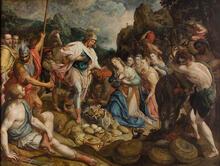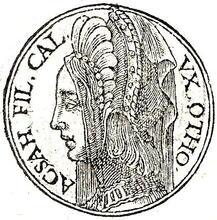Shulammite: Bible
Although unnamed, the Shulammite is specifically characterized in the Song of Solomon. She is described as very close to her mother, assertive, and extremely beautiful; images of plants and animals are often used to allude to her appearance. Her narrative is sensual and filled with longing as she waits for her lover. The Shulammite does not shy away from declaring her feelings and desires, and the Bible portrays her as a complex woman whose eroticism is celebrated.
Identity and Lineage
The Shulammite (from Hebrew shulammit, “woman of Jerusalem”) is the central figure in the Song of Solomon (also called Song of Songs or Canticles) and one of the most positive representations of young womanhood in the Hebrew Bible. As the embodiment of erotic pleasure, innocent and savored for its own sake, she is to be contrasted, on the one hand, with the wily seductress of Proverbs 7, whose sexuality is insidious and destructive, and on the other with figures such as Tamar and Ruth, whose sexual boldness is in the service of perpetuating the family line. In the Shulammite, indeed, we find one of the most unqualified celebrations of female eroticism in all of Western literature.
Like her lover, the Shulammite is not given a proper name. The epithet “the Shulammite,” which occurs (twice) in only one verse of the Song (6:13) and nowhere else in the Bible, is of uncertain meaning. Medieval Jewish exegetes such as Ibn Ezra understood the word as “the Jerusalemite,” a feminine epithet derived from Salem (Hebrew shalem), an ancient poetic name for Jerusalem (Psalms 76:2). The epithet Shulammite, with its root s-l-m, may have been chosen also because of its allusions to Solomon (Shelomoh), who figures in the poem, and to the young woman’s role of bringing “peace” (shalom) to her lover (8:10). Other less likely interpretations involve the village of Shunem or Shulem (the home of King David’s attendant, Abishag, 1 Kings 1:1–4), or the Mesopotamian war goddess Shulmanitu, perhaps Ishtar.
Although she is not as fully articulated as the characters in biblical prose fiction, the Shulammite has a distinct consistency of characterization throughout the Song. That she is probably just past the age of puberty is implied by the dialogue with her brothers in 8:8–10. They consider her a child (“We have a little sister,/and she has no breasts”); her spirited response (“my breasts are like towers”) indicates that she has already reached sexual maturity (see Ezekiel 16:7–8). There is no mention of a father in the poem; thus, the Shulammite’s brothers take responsibility for her conduct, about which they have rebuked her (1:6), as well as for marriage negotiations with potential suitors (8:8–9).
Her relationship with her mother appears to be close and tender. The Shulammite is called her mother’s favorite (6:9). She speaks of bringing her lover to her mother’s house (3:4; 8:2), perhaps to signify a more binding relationship or perhaps in reference to the fact that, from a female perspective, the family household was the mother’s domain. In one possible reading of 8:2, her mother can be seen as instructing her in the arts of love. The Shulammite addresses her feelings about love and her lover to a group of young women, the daughters of Jerusalem, who serve as a kind of chorus in the poem.
Physical Descriptions
The Shulammite’s beauty is celebrated in three formal praise songs, often called by the Arabic term wasfs (4:1–7; 6:4–10; 7:1–7; compare the praise of the man’s beauty in 5:10–16). The homage to the nude body is unique in the Bible and may perhaps indicate the influence of Hellenistic art. The poet’s metaphors and similes are not literally descriptive; they convey the delight of the lover in contemplating the beloved, finding in the body a reflected image of the world in its freshness and splendor.
Like her lover, the Shulammite is portrayed in images that suggest tenderness (lilies, doves, gazelles), as well as strength and stateliness (pillars, towers). The poet’s metaphors move back and forth between the actual landscape, suffused with erotic associations, and the landscape of the body: the Shulammite waits for her lover in a garden, but she herself is a garden. The lovers go out to the vineyards to make love, but she herself is a vineyard, her breasts like clusters of grapes, and their kisses an intoxicating wine. When the lovers are compared to animals, it is in tribute to their beauty and undomesticated freedom. Like her lover, the Shulammite has dovelike eyes and is associated with deer and gazelles. Perhaps strange to the contemporary reader is the comparison of the Shulammite in 1:9 to a mare (a familiar trope in Greek poetry), suggesting her elegant gracefulness.
The Shulammite calls herself “black and beautiful” (1:5–6). This is apparently a reference to her sunburned skin—according to her poetic phrase “the sun has gazed on me” (26). Working outdoors (she is “keeper of the vineyards” in 1:6) is perhaps associated with a lower social status; those who could afford not to work outdoors would have a fair complexion. The Shulammite’s need to account for her dark skin may sound apologetic; on the other hand, it is likely that she is boasting, not apologizing.
Apart from her youth and beauty, the Shulammite’s most striking characteristic is her assertiveness. She is described by her lover as ayummah (6:10); the word daunting conveys the spirit of the Hebrew better than the commonly rendered terrible. Only she makes dramatic statements about herself (1:5; 8:10), and only she commands the elements (4:16). She goes out into the streets of Jerusalem at night to search for her lover—bold and unusual behavior for an unmarried woman (3:1–4; 5:6–7). Her invitations to love (4:16; 7:11–13; 8:2) are more outspoken than his, and she is the one who apparently takes the initiative in their lovemaking: “I awakened you” (8:5).
Descriptions of Personality
The Shulammite speaks the first words in the poem—“kiss me” (1:2)—and the last (8:14); she delivers most of the lines, including the rousing speeches about the power of love (2:7; 8:6–7). Her voice and thoughts come directly to the reader, unmediated by a narrator. Her repeated adjurations to the daughters of Jerusalem (2:7; 3:5; 8:4), filled with awe at love’s power, convey the seriousness with which she regards this relationship. When she asks her lover to be true to her forever (8:6), she is expressing a hope for a permanent bond in language that is characteristically emphatic.
The lover’s affectionate phrase “my sister, my bride” (4:9–10, 12; 5:1, 2) is not to be taken literally; both epithets express closeness and intimacy. (In Egyptian love poetry, the lovers refer to each other as “sister” and “brother” as a sign of closeness.) In 8: i, the Shulammite says she wishes her lover was “like a brother”; then she could kiss him in the streets and no one would scorn her. The word bride reflects the young man’s desire for a permanent relationship; the Shulammite expresses a similar wish in 8:6. There is no indication in the poem that the lovers are married; that they meet secretly in the countryside at night and part at daybreak implies the contrary.
The most complex portrait of the Shulammite is also the most dramatic scene in the poem (5:2–8), conveying passion, coquetry, self-reproach, and yearning in quick succession. Her lover knocks at her door at night, ardent and impatient, but the Shulammite coyly pretends reluctance; as soon as he leaves, she is filled with regret and longing. Running through the streets of Jerusalem to search for him, she is apprehended and beaten by the city watchmen—one of the few dark moments in a poem filled with delight and celebration.
Bloch, Ariel, and Chana Bloch. The Song of Songs: A New Translation with an Introduction and Commentary. New York: 1995.
Fox, Michael V.The Song of Songs and the Ancient Egyptian Love Songs. Columbia: 1991.
Meyers, Carol, General Editor. Women in Scripture. New York: 2000.
Pope, Marvin H. Song of Songs: A New Translation with Introduction and Commentary. Garden City, NY: 1977.
Weems, Renita. “Song of Songs.” In Women’s Bible Commentary, edited by Carol A. Newsom and Sharon H. Ringe, 156–160. Louisville, KY: 1992 and 1998.











